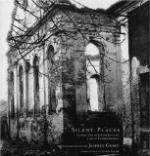The tendency seemed toward a mighty simplification, as though the complexities of the world were reverting toward their original philosophic unity. The complex summer had become simple autumn; the autumn, winter; now the very winter itself was apparently losing its differentiations of bushes and trees, hills and valleys, streams and living things. The growths were disappearing; the hills were flattening toward the great northern wastes; the rare creatures inhabiting these barrens took on the colour of their environment. The ptarmigan matched the snow,—the fox,—the ermine. They moved either invisible or as ghosts.
Little by little such dwindling of the materials for diverse observation, in alliance with the too-severe labour and the starving, brought about a strange concentration of ideas. The inner world seemed to undergo the same process of simplification as the outer. Extraneous considerations disappeared. The entire cosmos of experience came to be an expanse of white, themselves, and the Trail. These three reacted one on the other, and outside of them there was no reaction.
In the expanse of white was no food: their food was dwindling; the Trail led on into barren lands where no food was to be had. That was the circle that whirled insistent in their brains.
At night they sank down, felled by the sheer burden of weariness, and no matter how exhausted they might be the Trail continued, springing on with the same apparently tireless energy toward its unknown goal in the North. Gradually they lost sight of the ultimate object of their quest. It became obscured by the immediate object, and that was the following of the Trail. They forgot that a man had made it, or if for a moment it did occur to them that it was the product of some agency outside of and above itself, that agent loomed vaguely as a mysterious, extra-human power, like the winds or the cold or the great Wilderness itself. It did not seem possible that he could feel the need for food, for rest, that ever his vital forces could wane. In the north was starvation for them, a starvation to which they drew ever nearer day by day, but irresistibly the notion obsessed them that this forerunner, the forerunner of the Trail, proved no such material necessities, that he drew his sustenance from his environment in some mysterious manner not to be understood. Always on and on and on the Trail was destined to lead them until they died, and then the maker of it,—not Jingoss, not the Weasel, the defaulter, the man of flesh and blood and nerves and thoughts and the capacities for suffering,—but a being elusive as the aurora, an embodiment of that dread country, a servant of the unfriendly North, would return as he had done.
Over the land lay silence. The sea has its undertone on the stillest nights; the woods are quiet with an hundred lesser noises; but here was absolute, terrifying, smothering silence,—the suspension of all sound, even the least,—looming like a threatening cloud larger and more dreadful above the cowering imagination. The human soul demanded to shriek aloud in order to preserve its sanity, and yet a whisper uttered over against the heavy portent of this universal stillness seemed a profanation that left the spirit crouched beneath a fear of retribution. And then suddenly the aurora, the only privileged voice, would crackle like a silken banner.




